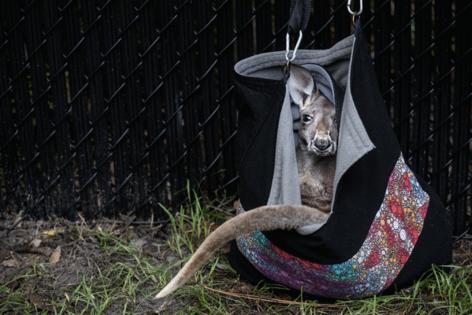Kangaroo hopping around Florida road highlights problems with exotic pets
Published in Science & Technology News
ORLANDO, Fla. — The stunning sight of a kangaroo hopping down a busy St. Cloud road made headlines last month and, for the animal sanctuary that took in the wayward marsupial, provided another reminder that ordinary people owning exotic animals is not always easy or wise.
“I blame the internet for people getting a lot of things they probably shouldn’t,” said Kylie Reynolds, deputy director of Amazing Animals, a nonprofit exotic animal sanctuary in Osceola County that helped capture and care for the kangaroo found along Old Hickory Tree Road.
Amazing Animals was founded 15 years ago as a reptile rescue due to the “big need” in Florida to take in the slithering ex-pets, she said. Now the nonprofit has more than 100 animals and takes in all kinds of exotic wildlife — most of them former pets.
On May 5, the sanctuary got a call about a kangaroo hopping down the road in St. Cloud and helped corner him in some bushes. The Florida Fish and Wildlife Commission was able to chemically immobilize the animal and then the male kangaroo — which the rescue named Hickory after the road where he was found — was transported to Amazing Animals, where he spent the next 10 days.
The kangaroo’s owner Bryan Steven Castro Rendon, 27, told FWC officials his friend forgot to close the door of the animal’s enclosure after feeding him on May 5, the day he escaped, records show. Rendon told the agency he acquired the kangaroo in New York about a month earlier.
FWC charged Rendon with second-degree misdemeanors related to the kangaroo’s escape and his failure to have proper state permits. He also was issued a warning for having an enclosure that was too small with fencing that was too low.
Rendon was allowed to take custody of the kangaroo again on May 15 only after getting a bigger enclosure with a double-door entry system and surrounded by an 8-foot tall wire fence, which the FWC inspected, records show.
Reached by phone, Rendon hung up without commenting.
Burmese pythons, an invasive species creating trouble in South Florida, may be the state’s most problematic exotic pet. The snakes were first introduced via that trade in the 1970s and then released into the wild by owners who no longer wanted them.
Amazing Animals, which started with snakes, still handles a lot of reptiles.
“We get a lot of calls for pythons and bearded dragons, and they’re just a little bit more work than people think,” Reynolds said. “A lot of times they’ll get bigger and live a long time and have lots of specialized care that people either can’t keep up with or don’t want to because they’re busy … and then realize it’s a lot more work than what they anticipated.”
The sanctuary also has two bobcats, six sloths, lemurs, capybaras, a caracal, a Geoffroy’s cat, birds of prey — and three kangaroos. Rufus, Amazing Animals’ resident male Red Kangaroo, was taken in after another animal sanctuary closed, and then the center brought in two baby kangaroos from another facility to keep him company.
The FWC regulates exotic pets and would-be owners must get permits, which can cost as much as $140 annually and require a log documenting hours of experience with the animal.
Across the state there are 918 active exotic pet licenses, data from FWC shows, and 91 of them are in Central Florida. The types of animals vary, but monkeys, skunks, racoons and crocodiles are the most common, the data shows.
When the kangaroo was found in St. Cloud, Reynolds’ group knew to try to keep the animal calm.
“They are very sensitive animals so they can, if you’re chasing them, they can drop from a heart attack, overheat or stress out,” Reynolds said.
Workers at Amazing Animals also moved other animals around their facility to give the new kangaroo a well-secured enclosure so he wouldn’t escape again, she added.
Would-be owners of exotic animals should ensure they understand state requirements, diet and veterinary needs before purchasing, Reynolds said.
“Doing your research is super important … for the well being of the animal and for you to be able to know what you’re actually getting into.”
Amazing Animals, located in St. Cloud on Rambler Avenue, is a private facility but does conduct tours that can be booked online. The hour-and-a-half tours cost $300 or more depending on group size.
------------
©2025 Orlando Sentinel. Visit at orlandosentinel.com. Distributed by Tribune Content Agency, LLC.







Comments